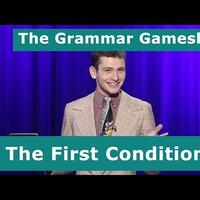10- The First Conditional
Hello, and welcome to today's Grammar Gameshow!
I'm your host, Will!
But I'm not followed by an infinitive,
just feelings of regret!
And of course, let's not forget Leslie,
our all-knowing voice in the sky.
Hello everyone!
Tonight, we're going to ask you three questions about…
The first conditional!
The structure that says something can happen,
only if something else happens first!
OK! Now, let's meet our contestants!
Hello, Will. My name is Sean!
And contestant number two?
It's nice to meet you. I'm Levington!
Wonderful!
Fresh meat!
OK. Let's get going
and don't forget you can play along at home too.
Our first round is an odd one out round.
Which of these statements about the first conditional
is not true?
The formula is: if + present simple + will + infinitive
First conditionals are used for possible present
or future consequences
The ‘if' clause can be at the beginning of the sentence
or in the middle
You can use the present simple, continuous
or perfect tense in the ‘if' clause.
OK!
Sean…what are you thinking?
Well, I know that a) is correct
because ‘if I am hungry, I will eat',
and I know that is correct.
And I'm pretty sure that d) is correct.
But I don't know about the others.
Good thinking!
Levington, how about you?
Well, I'm confident that b) is true,
because I remember reading that
even though we use a present tense,
it has a future meaning.
For example,
‘if I stay the extra day, I will be late next week'.
And I'm certain you can put
‘if' in the middle...
‘I will be late if I stay the extra day'.
But I don't know about the others.
OK!
Last chance!
Anyone?
No?
OK.
Leslie?
They're all correct.
The formula is
if + present tense + will + infinitive.
First conditionals can refer to possible
present or future consequences.
The ‘if' clause can go at the beginning of the sentence,
or in the middle.
And finally, it is possible to use the present
simple, continuous or perfect tenses.
For example:
If I play football, I will be healthy.
If I'm playing football, I will be sweaty
and, if I have played football, I will be tired.
Whoops! No points for you guys!
You should know, if you're on the Grammar Gameshow,
you won't be able to trust a word we say.
OK, on to our next question.
We've just said that the first conditional uses ‘if'
in the conditional clause
and ‘will' in the main clause.
But is it also possible to use ‘will'
in the conditional clause?
Sorry!
I pressed that by mistake. I've no idea!
The answer is ‘No'. Trust me.
You just said we can't trust a word you say!
That was before!
OK.
No, you cannot use ‘will' in the conditional clause.
Wrong I'm afraid.
Totally and utterly wrong.
How embarrassing.
Levington?
We can!
I'm going to need an example!
If Sean will keep trusting you,
he won't get any points.
Nice!
And topical. Great!
Leslie?
Well done!
‘will' can be used in the conditional clause
when a person is being insistent,
or showing irritation at someone.
Another example would be:
if you will leave the windows open when you go out,
you will get burgled!
Levington?
Ten points for you!
OK. Last question.
How can we make a first conditional more formal?
We have to replace ‘if' with a word
- either ‘should' or ‘had'.
You'll have to choose, I'm afraid.
I would choose ‘should' if I were you.
Trust me.
The answer is ‘had'.
Leslie?
Sorry Sean. Not quite right.
We do replace the ‘if', but with ‘should'.
For example,
‘If I go' becomes ‘should I go'.
And don't forget that in a negative,
we use ‘not' instead of ‘don't'
For example:
‘if I don't go' – ‘should I not go'.
Wrong again! But
if you can give me an example,
I'll give you twenty points.
Should I get this correct, I will receive 20 points!
Well done!
Twenty points to Levington.
Oh!
I'm sorry…did you think I was talking to you?
Never mind!
And that brings us to the end of today's
Grammar Gameshow.
And the winner is…
Levington! Well done!
Here's what you've won!
It's a chopstick!
Just the one though!
We'll see you again next week
where you can play for another prize.
And Sean?
Yes?
I like you so much,
I'm not going to drop you down the pit.
Trust me.
Release the donkeys!
It looks like we'll need another contestant.
Thanks for joining us,
and say goodbye Leslie
Goodbye, Leslie
See you next time.

